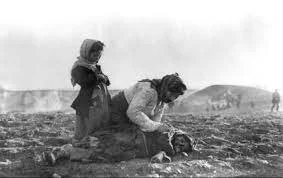Please join us in remembering THE 100TH YEAR ANNIVERSARY OF GENOCIDE ON SUNDAY OCT. 16. of the Asia Minor and Pontic Greek Orthodox Christians, by offering a memorial service and a reception with heavy hors d'oeuvre.. After the service there will be a heavey and screening of “Lethal Nationalism: Genocide of the Greeks”. Contact Rene Mueller (muellerr@cofc.edu) to include your family’s name in the service. We would love to have family names, origin (Turkish cities/regions), and any photos or stories you want to share.
Greco-Turkish War of 1919-1922
Asia Minor has been the center of Greek Christianity for almost two thousand years until the Ottomans conquered Constantinople in 1453. The Greeks always suffered under Turkish rule but events escalated after 1908, when the Young Turks overthrew the Ottoman Sultan and initiated a “Turkey for Turks” only policy. Seeking to drive the Greeks out of Turkey, the government sponsored boycotts of Greek establishments, prohibited Greeks from selling to Turks. Olive orchards and farms were destroyed throwing Greeks into extreme poverty. Greeks had to pay a special taxes and extortion by official was routine. Shops and homes were routinely plundered and violence against Greeks escalated. Greeks were murdered without cause. Frequently, whole villages would be attacked and, if inhabitants fought back, they were slaughtered.
In an effort to Turkify Greeks, Greeks were forced into Turkish villages in the hopes that they would convert to Islam. Greek boys and men were deported to the interior to work in concentration camps where most perished. All place names were changed from Greek to Turkish. Many Greeks were sent on death marches to the interior where the majority starved or died of exposure. Women and girls were routinely raped and kidnapped for Muslim Harems. Newspapers openly exhorted violence and preached the extermination of the Christians. The wealthiest Greeks escaped to Greece or other countries; others fled to Smyrna which where they felt they would be protected by Western powers.
Atrocities escalated during the Greco-Turkish War of 1919-1922 when hundreds of thousands fled with the retreating Greek army to Smyrna, which a. predominantly Greek city. On September 9, 1992, Turkish forces set the city afire completely destroyed the Greek, Armenian, and Levantine quarters. Refugees fled to the quay to escape. Confusion and international politics hindered the rescue and thousands of refugees were slaughtered, died, or committed suicide; girls and women were raped or captured and sent to harems. Greek and Armenian men aged 15 and older were seized, deported to the interior of Anatolia and were never heard from again.
Metropolitan Chrysostomos Kalafatis, head of the Greek Orthodox community, was offered safe passage out of Smyrna but was determined to stay with his flock. On September 10, a Turkish mob accosted him, stabbed him, tore off his beard, gouged out his eyes, and cut off his ears and nose before the mob dragged him throughout the city. He was declared a martyr and a saint on November 4,1992. He is commemorated with other ethnomartyrs on the Sunday before the
exaltation of the Holy Cross (September 7-13).
It is estimated that from 1900-1923, the various Turkish regimes killed 3.5-4.5 million Christians (Greeks, Assyrians and Armenians). Greece’s population increased 26 percent with the arrival of the refugees and most modern Greeks have ancestors from Asia Minor. The International Association of Genocide Scholars recognizes the Ottoman campaign against Christian minorities of the Empire between 1914 and 1923 as constituting genocide. The Turkish government utterly rejects this claim. Prior to the genocide, over 2 million Greeks lived in Turkey. Today, fewer than 2000 Greeks reside in Turkey. Family last names that end in idis/ides, iadis/iades, elis/ilis, oglou/ogulu denote Asia Minor ancestry.
Please join us for a memorial service and the coffee hour with heavy hors d'oeuvre.
